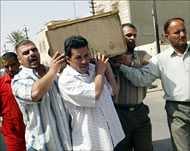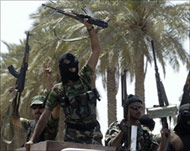Attacks leave many dead in Iraq
Attacks on Iraqi forces and several assassinations have left at least 11 people dead and 50 wounded.

On Tuesday, fighters opened fire on members of Iraq‘s National Guard in Khaldiya, west of Baghdad, killing five people.
In Baghdad, a car bomber killed at least five people, including two guardsmen in the Adhamiya district, where fighters are active, Aljazeera reported.
At least 20 people were wounded in the blast.
“The attack was carried out by a suicide bomber driving a green-coloured Kia minibus”, an Interior Ministry official said.
“Most of the victims were would-be recruits who wanted to join the army,” he added.
In Baquba, 60km northeast of the capital, a roadside bomb missed a US military convoy but wounded three nearby civilians, police said.
Series of killings
On Tuesday morning, masked men armed with machine guns and travelling in two cars shot and killed professor Fuad Ibrahim Muhammad al-Bayati as he left his home for work at the University of Baghdad, police said.
Ten armed men killed a senior Defence Ministry adviser in his Baghdad home. Officials identified the man who was killed late on Monday along with his son, as Major-General Adnan Midhish al-Qaraghulli.
 |
|
Relatives carry al-Qaraghulli’s |
Separately, Iraqi police announced that a police Brigadier-General Yunis Muhammad Sulaiman was murdered on his way to work in Mosul on Sunday.
In another attack on Monday evening, Brigadier-General Husain Hatu al-Jibairi, and his driver were shot dead in their car in Amara, 350km southeast of Baghdad, police captain Karim Assaf said.
Al-Jibairi was an inspector general for the Interior Ministry responsible for three southern provinces.
The killings come as tensions continue to grow in al-Madain.
Iraqi forces regained control of the town near Baghdad, arresting about 40 people, Aljazeera learned.
The three-day standoff around al-Madain, fuelled by rumour, suspicion and sharply contradictory reports, had threatened to spiral into an all-out national crisis, as Sunnis and Shia continue to haggle over forming a new government two and a half months after landmark elections.
Rumours
“These were just rumours promoted by the media and other parties to create a fight in the area,” outgoing interim Interior Minister Falah al-Naqib, a Sunni, said during a visit to the town.
|
“There are no signs of any killings” Iraqi Brigadier-General Muhammad Sabri Latif |
Earlier, a 1500-strong Iraqi force backed by US soldiers swept into town, but all they found were deserted streets, shuttered shops and most of the 7000 residents cowering in their homes, an AFP correspondent embedded with US troops reported.
“I don’t think we’ll find any,” said Iraqi Brigadier-General Muhammad Sabri Latif.
“I think they (armed men) ran away to the other side of the river. Possibly they took hostages with them. There are no signs of any killings.”
The prime minister’s office confirmed in a statement that no captives were found in al-Madain, 30km southeast of the capital, in an area considered a fighter stronghold.
Empty streets
Hooded Iraqi commandos in four-wheel drive vehicles and green-and-yellow pick-up trucks flying large Iraqi flags patrolled the deserted streets, backed by US soldiers and Apache attack helicopters.
The military operation followed reports that Sunni armed men on Friday abducted up to 80 people and threatened to kill them unless all Shia left the town.
 |
|
Iraqi special forces found no |
The report, originating with people fleeing the town and officials from the interior and defence ministries, was given front-page coverage in the Iraqi press and sent shockwaves throughout parliament where members called for immediate military action.
In al-Madain on Monday, Major- General Adnan Thabit suggested hostages had been held in the town, but only as a result of a “tribal problem” and that “media channels and some political parties made a huge issue of it”.
But according to one civilian, Ayad Tallal, 22, who arrived in town on Saturday to visit relatives, armed men had been terrorising the inhabitants for weeks, threatening to kill anyone who collaborated with the authorities.
The US military said Iraqi forces were pushing south of the town along the River Tigris to sweep through villages.
Iraqi commandos also came across a car bomb factory in an abandoned farm, along with detonators and mortar rounds.
Sectarian tensions
The latest incident threatened to raise sectarian tensions between the Shia majority, whose main political bloc took a majority of seats in parliament in January’s elections, and Sunnis who have lost the privilege and power they enjoyed under Saddam Hussein’s ousted government.
Elsewhere, Iraqi police battled fighters who tried to overrun a police station in the main northern city of Mosul on Monday, as US troops arrested 18 others in nearby Tal Afar, a US military statement said.
|
“No to terrorism. No to occupation” |
Nearly 50 fighters firing mortars, rocket-propelled grenades and guns attacked a Mosul police station. Police managed to fend off the attackers, the US statement said without elaborating.
Iraq‘s third largest city is a stronghold of anti-US fighters which has been gripped by violence since November when police abandoned their posts following fighter attacks.
In Tal Afar, to the west, US troops detained 18 suspected fighters, the US statement said.
Demonstrations
And at least 10 people were killed in attacks, while saboteurs set ablaze an oil pipeline linking the northern oil centre of Kirkuk to the Baiji refinery.
On Monday, about 150 Shia from nearby Hurriya village staged a demonstration in Baghdad, weeping and holding photos of 18 men and boys they said had been missing for about 10 days.
In another protest in Baghdad, hundreds of Shia demanded the withdrawal of US forces from Iraq and condemned all terrorist attacks against Iraqis.
Raising Iraqi flags, the protesters chanted: “No to terrorism. No to occupation.”